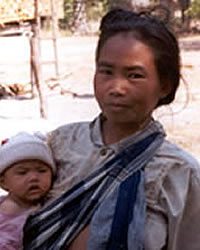Bru, Eastern in Thailand

Photo Source:
Copyrighted © 2026
Peoples of Laos, Asia Harvest All rights reserved. Used with permission |
Send Joshua Project a map of this people group.
|
| People Name: | Bru, Eastern |
| Country: | Thailand |
| 10/40 Window: | Yes |
| Population: | 26,000 |
| World Population: | 120,000 |
| Primary Language: | Bru, Eastern |
| Primary Religion: | Buddhism |
| Christian Adherents: | 2.00 % |
| Evangelicals: | 1.00 % |
| Scripture: | Complete Bible |
| Ministry Resources: | Yes |
| Jesus Film: | Yes |
| Audio Recordings: | Yes |
| People Cluster: | Mon-Khmer |
| Affinity Bloc: | Southeast Asian Peoples |
| Progress Level: |
|
Introduction / History
The Bru are descendants of the great Khmer Empire, which flourished between the ninth and thirteenth centuries and encompassed present-day Thailand, Cambodia, Laos, and southern Vietnam. Its power declined after being conquered by the Thai and Vietnamese. About 400 years ago, the Bru were pushed out of the best valley lands in northern Laos and forced southward by the Thai-speaking peoples. The word bru literally means "mountain." This name was probably given to them in reference to their current geographical location. The Western Bru of Laos live along the borders of Thailand, while the Eastern Bru live along the borders of Vietnam. A smaller number of the Eastern Bru live in Thailand. Though the two groups speak the same language (Bru), their dialects are not mutually understood. In fact, the dialects may even vary within the same village. Some of the Bru are bilingual, speaking both their native language and Lao.
What Are Their Lives Like?
Most of the Bru are wet-rice farmers. Their fields are prepared with plows drawn by buffalo or oxen; very few farmers use modern equipment. Many of the Bru who live in the mountainous regions or highlands continue to practice "slash and burn" farming. Many also hunt and fish to supplement their incomes. Others have become skilled merchants. Their villages are typically located along the banks of rivers or streams. The Bru live in small, self-governing villages that are usually limited to a single valley. Each village is under the control of the chao muong, or prince, to whom the commoners pay taxes. The village headman, who is the eldest male, decides all important issues. All marriages are monogamous, and each family is under the leadership of the oldest male. Bru folk art and literature are fairly well developed. They have a variety of musical instruments, which they play skillfully, accompanied by singing and narrative readings. Their houses are usually arranged in a circle, surrounding a central "community house." Each home, which stands on stilts, is divided into several rooms to accommodate the extended family. Each house contains a fireplace for preparing meals. The first room is used to receive guests. It also includes a sacred shrine for spirit worship.
What Are Their Beliefs?
Virtually all of the Bru are ethnic religionists, practicing their own traditional religion. Ancestor worship (praying to deceased ancestors for prosperity, guidance and protection) is the most important activity. Each clan has a common worship place in which the dead are offered uncooked rice, water and broken bowls. These ancestral spirits are thought to cause illnesses if they are not properly appeased. The Bru also believe in various spirits of nature and each village has a particular "guardian spirit."
What Are Their Needs?
The Bru people in Thailand need modern farm equipment and a greater harvest.
Prayer Points
Pray for a great rice harvest among the Eastern Bru that will convince them that Jehovah is indeed their provider. Pray for a spiritual hunger among the Bru people in Thailand that will lead them into the light of Christ. Pray for a movement to Christ this decade among every Bru group in Thailand and Laos. Pray for Holy Spirit-directed missionaries to go the Eastern Bru people in Thailand.